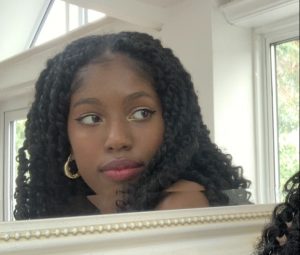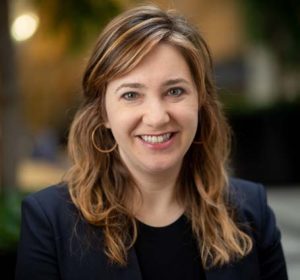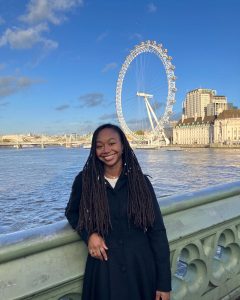Johns Hopkins UniversityEst. 1876
America’s First Research University
Yasmine Bolden has a self-imposed rule to take one class each year at Hopkins they know they will love. For the sophomore double majoring in The Writing Seminars and Africana Studies, this year’s selection is Community-Based Learning (CBL), a course that brings together Johns Hopkins undergraduates with young writers and poets from Baltimore City high schools.

“This is a class that I know I will have a good time in and will be challenged by, but I won’t be sweating over an exam,” Bolden says. “It’s been my safe space on campus for the semester, which has motivated me to have my heart in it without worrying so much about quantitative evaluations.”
Community-Based Learning is open to the entire Hopkins undergraduate student body and engages Writers in Baltimore Schools (WBS), a self-selected group of young writers in high school led by community partner Patrice Hutton. Dora Malech, a poet and associate professor in The Writing Seminars, teaches a spring session of CBL that focuses on poetry. She defines CBL — like service learning, a high-impact practice with evidence of significant educational benefits for students, including and especially from demographic groups historically underserved by higher education — as a teaching technique in which the work from a classroom is a collaboration among the professor, the students, and an outside partner. The result is a more collaborative, mutually beneficial community.
One of the great things about the class, Malech adds, is that it brings together students who cross a range of disciplines. It disrupts, in a positive way, the potential hierarchy between the high school students and the undergraduates. Some of the younger students have more experience with the techniques of writing, performing, and reading poetry, while the college students offer perspectives as motivated, college-level learners.
“Most of the Hopkins student body is not from Baltimore and may not have had all the opportunities to immerse themselves in the literary community here,” Malech says. “This is a chance for them to do that and get to know a little bit about Baltimore, where it’s also a chance for high school students to get a sense of what a college-level classroom is like, to feel welcome on and familiar with the Hopkins campus, and to think of Hopkins as an asset to them and their city.”

For Bolden, who grew up in Northern Virginia, learning alongside high school students offers fresh insight not just into Baltimore’s literary community, but also into new ways of asking questions and making personal and cultural connections to poetry.
“When you’re in academia and you’re meeting with these famous writers, you feel like you have to present questions in a certain way; they have to be very clinical questions,” Bolden explains. “The WBS students completely shatter that notion. They’re not afraid to ask questions like, ‘I noticed in your bio, you mentioned this, and I’m curious — do you like this TV show and why?’”
For the WBS students, taking the course is a matter of passion, not class credit. It’s a commitment, and for almost all of the high schoolers, JHU and the CBL program have to coordinate travel on buses across the city to attend the weekly class on the Homewood campus. Some get home as late as 8:30 on CBL nights, Malech says. Students’ city-provided bus passes have a limited number of transfers and stop working after 8 p.m., which limits enrichment opportunities like CBL without coordinated transportation.
Buses for the high school students, along with community partner stipends, are major expenses for both the fall and spring offerings of the course. Though the Krieger School of Arts and Sciences has committed to funding the course for three years through the Dean’s Discretionary Fund, more gifts are needed to maintain the enriching and impactful class.
Despite the additional coursework and time, Baltimore City College graduate Kaya Dia, now a Hopkins sophomore majoring in The Writing Seminars, participated in CBL for the entirety of her high school career. She took poetry with Malech, as well as nonfiction and fiction writing with Katharine Noel, an associate teaching professor and director of Undergraduate Studies in The Writing Seminars, who also teaches CBL courses with WBS.

Dia says poetry didn’t make sense to her initially. But a freshman English teacher convinced her to take the course.
“People tend to show kids poetry that rhymes a lot, and they get the impression that that’s all poetry can do,” Dia says. “Being able to take the Community-Based Learning class as a high schooler allowed me to realize what an interest I had in poetry, to experiment with it, and realize how much of an impact it has on our society and how much it can help us understand politics and ourselves.”
Working with undergraduates on campus was initially intimidating, and Dia admits she expected a gap in understanding between herself and the college students. But she found them easy to talk to, even about things outside of CBL, and her involvement in the course helped her gain confidence and feel more grounded in a collegiate environment. It even helped influence her decision to attend JHU.
“What I was able to get out of it, how I grew as a writer and as a student, I just loved it,” Dia says.
Dia isn’t alone in her admiration for the class. Hopkins alumni and WBS students often remain connected to the course and will come back to visit. Some even discovered a passion for teaching, and many of the high school students who participate in the class go on to work in Baltimore schools after college.
Former CBL students stay connected in other ways, Malech says. Often, students who have participated will buy books for the high school students that are necessary for the course, eager to give back to the course in some small way.
“To me, that positivity goes beyond a fun class where students get out of their comfort zone,” Malech says. “It’s now a part of their identity and a part of their life.”
Topics: Faculty and Staff, Krieger School of Arts & Sciences, Students, Strengthening Partnerships, Support Scholars